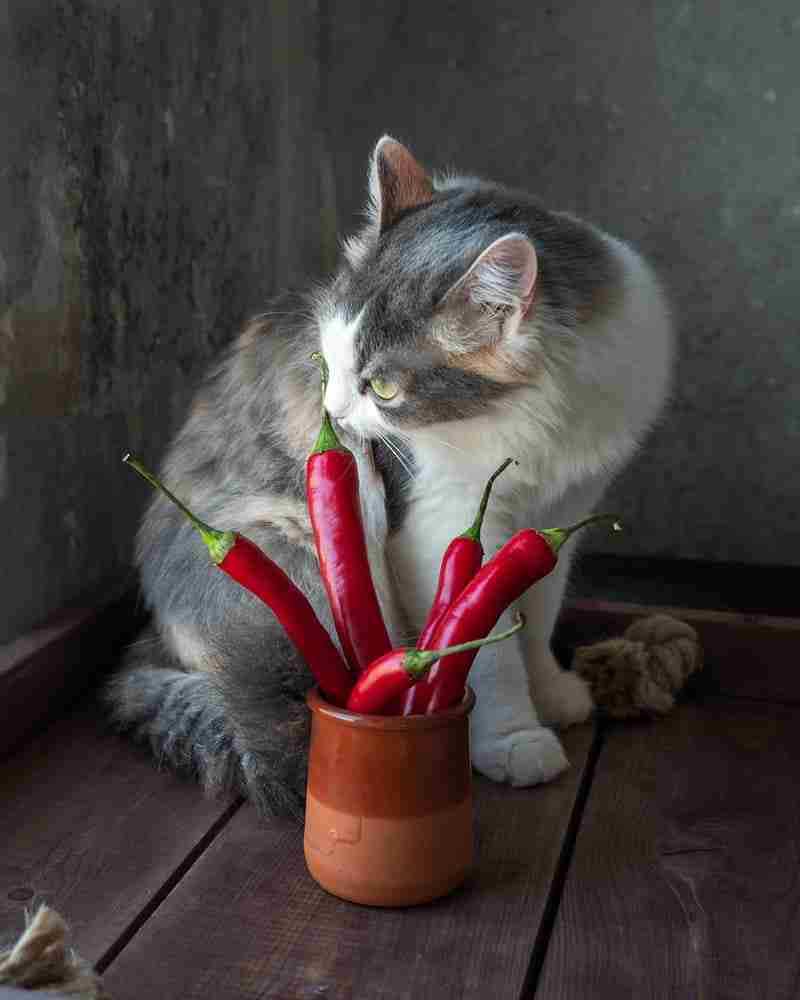Can cats eat spicy food? Can they taste spicy? No, cats don’t like spicy food and it can mess with their digestive system. Read on to learn more…
Do you love spicy food as much as we do? We love tucking into some enchiladas with chicken and rice. The extra hint of chili in the dish makes it fantastic, and there are always plenty of leftovers.
The problem with the leftovers is when your family’s feline members decide to give it a go and enjoy the spicy treat.
If you’re coming back from clearing the dinner table to find kitty up on the counter munching away at your enchiladas, it could be a problem.
Just because you own a Mexican hairless doesn’t mean they enjoy enchiladas. So, do you have to worry about your kitty? Are they going to be okay?
Can I Feed My Cat Spicy Foods?
Cats are obligate carnivores. That means their digestive system evolved to rely on meat for its nutrition source. Meat is high in protein and fat and contains no carbohydrates.
Therefore, your cat’s digestive system evolved over millions of years to rely on protein and fat alone. Introducing other dietary elements into their meals, like spices, can harm their digestive health.
The feline gut biome can’t handle anything other than the nutrient found in vet-approved kibble and meat. If the cat consumes anything outside of this diet, it results in digestive discomfort.
Chances are your cat avoids spicy food. You could leave those enchiladas on the table, and they walk over to them, look at you, and turn up their nose in disgust. “You think your cooking is good enough for me?”
The fact is cats have a hypersensitive sense of smell. Most of them can tell there are spices in the food, and it starts irritating their sinus.
However, if your food is only slightly spicy, your cat might decide to give it a try anyway. You can expect it to only take one bite before running to the water bowl.
Cat’s don’t like spicy food. They have different taste buds to us, and they don’t enjoy anything sweet or spicy.
However, they might eat more than one mouthful on a rare occasion, and they might swallow the spiced meat or veggies in the dish.
If that occurs, prepare yourself for an evening you won’t forget.

What Are The Effects Of Spicy Food On Cats?
The feline gut biome doesn’t have the same capacity as ours to shift between dietary sources. As omnivores, the human digestive system can handle a variety of foods without any digestive issues.
However, some of us are more sensitive than others to the capsaicin found in spicy foods. If you’ve ever taken a dare to eat a ghost pepper or Carolina Reaper, you’ll know the after-effects on your digestive system from making that mistake.
While the heat is just about unbearable in your mouth, 12 to 14-hours later, you’re screaming in agony as your digestive system struggles to deal with the huge dose of capsaicin.
We’ve all been there. Those pains can last for minutes or hours, depending on how much capsaicin you consume.
Now imagine that same experience for your cat. While we at least have some resilience to the capsaicin, it’s a totally foreign micronutrient to your cat’s gut.
The result is an extreme amount of pain if any capsaicin enters your kitty’s digestive system. It typically takes around six to 12-hours to start seeing the effects of the capsaicin play out in your kitty.
When it does, you’ll notice them mewing by their litterbox and scratching around in discomfort.
What Spices Are Dangerous To My Cats’ Health?

Apart from chilies, here are a few other spices and a bulbous vegetable that are toxic to your cat.
Garlic
Technically, garlic isn’t a spice, but we’ll include it here anyway. This bulbous herb tastes great in pasta dishes—however, it’s incredibly toxic to your cat. The allicin in garlic can cause severe digestive inflammation, and large amounts may result in the onset of toxic shock.
Turmeric
This Indian herb is a staple in curries and other spicy eastern foods. Turmeric has tremendous digestive benefits for humans. It contains curcumin, a potent anti-inflammatory compound reducing digestive inflammation. Unfortunately, turmeric causes an opposite reaction in cats, sending them to the emergency room.
Nutmeg
Nutmeg is a sweet spice often used in seasoning Mediterranean dishes, stews, and other meals. However, the myristicin found in nutmeg is toxic to cats. If your cat eats a large amount of nutmeg by mistake, it results in dry mouth, high blood pressure, and the potential for seizures.
Cinnamon
We love a slice of pumpkin pie with some cinnamon, don’t you? Unfortunately, your kitty lacks the liver and digestive enzymes required to break down the spice. Cinnamon toxicity may result in vomiting, diarrhea, and skin irritation in your cat.
Onions
Sure, we get it; onions aren’t a spice. However, they’re a frequent vegetable used in cooking. Onions contain thiosulphates, a sulfuric compound. These compounds are toxic to cats, causing damage to red blood cells in your cat.
It’s important to note that onion powder is even more toxic than raw onion. That’s important to remember because home chefs use onion powder in many dishes. It’s also a favorite ingredient in many snack foods.
Avoid feeding your kitty anything off the vet’s recommended menu. Sure, your cat might be meowing in frustration, begging you for that last Dorito chip. However, they’ll be mewing at you if you were sitting there with a salad.
Don’t let your cat eat anything but vet-recommended kibble or meat – fish is another great protein source for a cat’s diet as well.
In Closing – Keep Spices Away From Your Kitty
Keep your cat away from the enchilada leftovers, and they won’t spend the night digging around the sandbox in despair.
In most cases, your cat won’t consume enough capsaicin to warrant a trip to the vet. However, it’s a good idea to monitor their behavior for 12-hours and determine the extent of their symptoms. If they look really bad, take them to the vet for a diagnosis.
Avoid leaving food out that might tempt your cat, and ensure they always get nutritious meals to prevent them from going hungry.
